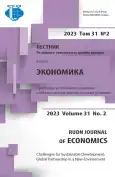Foreign trade relations between Russian Federation and Syrian Arab Republic in terms of Eurasian integration
- Authors: Tinkova A.A.1, Digilina O.B.1, Alkanj Alabseh Y.1
-
Affiliations:
- RUDN University
- Issue: Vol 31, No 2 (2023): CHALLENGES FOR SUSTAINABLE DEVELOPMENT: GLOBAL PARTNERSHIP IN A NEW ENVIRONMENT
- Pages: 253-267
- Section: INTERNATIONAL TRADE IN THE CONDITIONS OF GLOBALIZATION
- URL: https://journal-vniispk.ru/2313-2329/article/view/324331
- DOI: https://doi.org/10.22363/2313-2329-2023-31-2-253-267
- EDN: https://elibrary.ru/AZBBPZ
- ID: 324331
Cite item
Full Text
Abstract
The issues of the relevance of foreign trade cooperation between Russia and Syria, including the opportunities and risks of the Syrian economy for partners; the current state of bilateral trade between Russia and Syria; Syria as a promising direction for the Russian export business and the need for its development are considered. The authors analyzed the foreign trade potential of the dynamics and structure of foreign trade relations, identified comparative advantages in the world commodity markets, determined the place and role of bilateral foreign trade partnership. Russia is one of the key export markets for Syrian agricultural products, whose price competitiveness is supported by zero preferential duties within the framework of the unified system of preferences of the Eurasian Economic Union. In the course of the study, the authors identified the volume of unrealized export potential of Syria to the EAEU countries and vice versa, including in the structure of goods. It is concluded that it is necessary to develop trade relations on a bilateral basis with the help of instruments aimed at raising awareness of consumer demand and supply of national producers, as well as through “soft power” instruments in the field of education. It seems that Syria’s obtaining observer status in the EAEU will become an incentive to strengthen trust relations and investment attractiveness, which, in turn, will become the basis for joint work on infrastructure cross-border logistics projects in Syria (the Five Seas Strategy) and will reduce costs for increasing mutually beneficial bilateral trade. The study contains theoretical and statistical justification, as well as practical proposals for the development of friendly relations and strategic partnership with the Syrian Arab Republic in the context of the development of integration processes of the Eurasian Economic Union.
Keywords
About the authors
Arina A. Tinkova
RUDN University
Email: tinkova-aa@rudn.ru
ORCID iD: 0000-0002-8822-1945
PhD student, an assistant of the Department of International Economic Relations, Faculty of Economics
6 Miklukho-Maklaya St, Moscow, 117198, Russian FederationOlga B. Digilina
RUDN University
Email: o.b.digilina@mail.ru
ORCID iD: 0000-0002-9148-6776
Doctor of Economics, Professor of the Department of Political Economy
6 Miklukho-Maklaya St, Moscow, 117198, Russian FederationYamen Alkanj Alabseh
RUDN University
Author for correspondence.
Email: 1042225126@rudn.ru
ORCID iD: 0000-0002-6507-3572
PhD student, the Department of International Economic Relations, Faculty of Economics
6 Miklukho-Maklaya St, Moscow, 117198, Russian FederationReferences
- Aksenenok, A. (2020). Russia and Syria: Nuances in Allied Relations. RIAC. Retrieved December 20, 2022, from https://russiancouncil.ru/analytics-and-comments/analytics/rossiya-i-siriyanyuansy-soyuznicheskikh-otnosheniy/ (In Russ.)
- Al Humssi, A., & Chaplyuk, V.Z. (2015). Improvement of state regulation of foreign economic activity of Syria. Bulletin of Eurasian Science. 6 (31). 3–15. http://dx.doi. org/10.15862/07EVN615 (In Russ.).
- Al’ Humssi, A. (2015). Statistical analysis and priorities of foreign economic relations on the example of Syria. Bulletin of Eurasian Science. 5 (30). 3–15. http://dx.doi.org/10.15862/140EVN515 (In Russ.).
- Alhaj Omar, Mahmoud F.I., Cedano K.G. (2023). Energy poverty in the face of armed conflict: The challenge of appropriate assessment in wartime Syria. Energy Research & Social Science, Vol. 95. Retrieved December 20, 2022, from https://doi.org/10.1016/j.erss.2022.102910
- Belcastro, F. (2019). Syria and the USSR. Syrian Foreign Policy. Routledge. 182. https://doi.org/10.4324/9780429060779
- Bortalevich, S.I., Loginov, E.L., & Shkuta, A.A. (2016). Problems and Opportunities for the Development of the Syrian Economy as a Partner of the Eurasian Economic Union. National Interests: Priorities and Security.12 (345). 143–152. (In Russ.).
- Eid, A.Kh. (2022). Economic relations between Russiaand Russia: investments, commodity and prospects. Vestnik Universiteta. 6. 133–139. https://doi.org/10.26425/1816-4277-2022-6133-139 (In Russ.).
- Gobat, J., & Kostial, K. (2016). Syria’s Conflict Economy. IMF working papers, № 16/123, P. 1–29.
- Homsi, M. (2018). Forms and directions of migration from the countries of the Middle East in 1990–2017. RUDN Journal of Economics. 26 (4). 730–741. https://doi.org/10.22363/23132329-2018-26-4-730-741 (In Russ.).
- Iyad, A. (2019). Investment Practice of Russia and Syria: Comparative Analysis. Economic Strategies. 21. 1 (159). 42–47.
- Karsh, E. (2013).The Soviet Union and Syria (RLE Syria). Routledge. 144. https://doi.org/10.4324/9781315818986
- Krizhanovskaya, M. (2019). Possibilities of post-war reconstruction of Syria with mutually beneficial cooperation with small and medium-sized businesses of Russia. Post-Soviet continent. 2 (22). 80–87. (In Russ.).
- Matar, L. (2016). The Political Economy of Investment in Syria. Series: Studies in the Political Economy of Public Policy (PEPP). Palgrave Macmillan. 184. https://doi.org/10.1057/9781137397720
- Mohsen, A.S. (2015). Effects of exports and investment on the economic growth in Syria. International Journal of Management, accounting, and economics, Vol. 2. № 6. P. 527–537.
- Shchetinina, E.D., & Hamdan, M. (2018). Determinants of Foreign Direct Investment in Host Countries — The Situation in Syria. Bulletin of BSTU named after V.G. Shukhov. 5. 144–154. https://doi.org/10.12737/article_5af5a7353de584.18814479 (In Russ.).
- Suliman, F., & Khwanda, H. (2020). External Sector: Between Congestion and Sanctions — ‘Syrian Economy Case, 1987–2018. Foreign Trade Review, № 55 (3), P. 382–401. https://doi.org/10.1177/0015732520919839
- The Economist (2021). Ten years of war have broken Syria into pieces. Retrieved December 20, 2022, from https://www.economist.com/middle-east-and-africa/2021/03/13/ten-years-ofwar-have-broken-syria-into-pieces
- The World Bank (2017). The Toll of War: The Economic and Social Consequences of the Conflict in Syria. 148 p. Retrieved December 20, 2022, from https://www.worldbank.org/en/country/syria/publication/the-toll-of-war-the-economic-and-social-consequences-of-the-conflict-in-syria
- Yazigi, J. (2014). Syria’s war economy. European Council on Foreign Relations (ECFR), p. 1–7.
- Yuzhakov, V.A. (2018). Russia and Syria: 70 years of trade and economic cooperation. Military scientific and practical Bulletin. 1 (8). 116–121. (In Russ.).
Supplementary files









